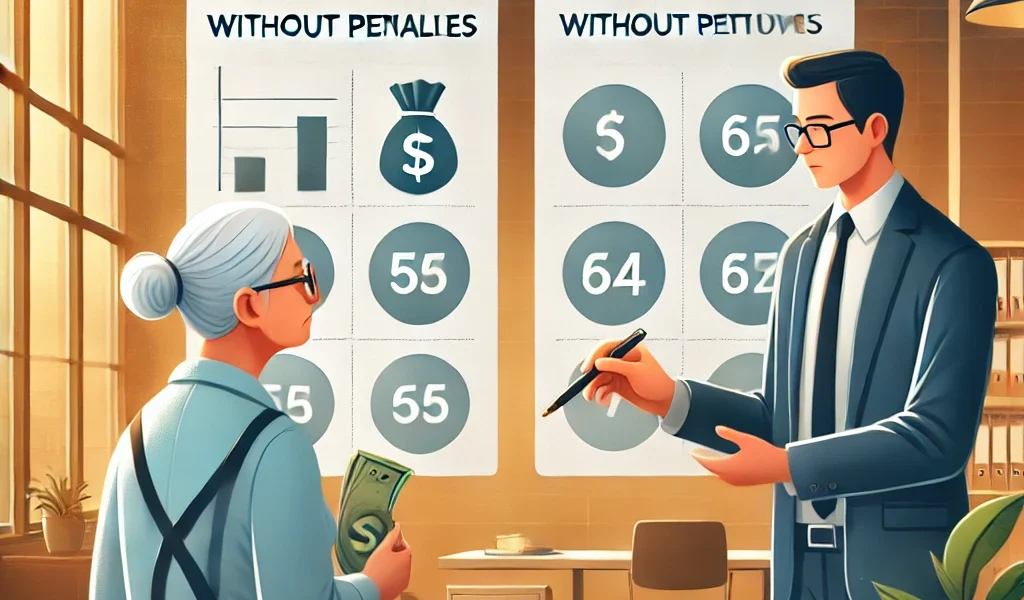Introduction
Retirement savings are meant to provide financial security in your golden years. However, life’s unpredictable nature may lead to situations where you need to withdraw funds earlier than expected. While most retirement accounts impose penalties for early withdrawals, there are several strategies and exceptions that allow you to access your funds without incurring unnecessary charges.
In this article, we will explore different ways to withdraw money from retirement funds without penalties, ensuring that you make the best financial decisions while preserving your savings for the future.
Understanding Early Withdrawal Penalties
Most retirement plans, including 401(k), Traditional IRA, and Roth IRA, impose a 10% early withdrawal penalty if you withdraw funds before the age of 59½. Additionally, withdrawals may be subject to income tax depending on the type of retirement account.
To avoid penalties, it’s crucial to understand your options and plan strategically. Below are various ways to withdraw from your retirement funds without incurring penalties.
Penalty-Free Ways to Withdraw Retirement Funds
1. Age-Based Withdrawals (After Age 59½)
Once you reach 59½, you can withdraw funds from most retirement accounts without incurring the 10% early withdrawal penalty. However, depending on the type of account, your withdrawals may still be subject to income tax.
✅ Traditional IRA & 401(k): Withdrawals are taxed as ordinary income. ✅ Roth IRA: Withdrawals are tax-free, provided the account has been open for at least five years.
2. Roth IRA Contributions (Anytime, Tax & Penalty-Free)
One major advantage of a Roth IRA is that you can withdraw your original contributions (not earnings) at any time, tax- and penalty-free.
✅ Earnings can be withdrawn tax- and penalty-free if:
- You are 59½ or older.
- The Roth IRA has been open for at least five years.
3. Substantially Equal Periodic Payments (SEPP) – Rule 72(t)
The 72(t) rule allows penalty-free withdrawals from IRAs and 401(k) accounts before age 59½, provided that you take substantially equal periodic payments (SEPPs) for at least five years or until you reach 59½, whichever is longer.
✅ Payments are based on IRS formulas and must remain consistent. ✅ Withdrawals are still subject to income tax. ✅ Changing or stopping payments early can result in penalties.
4. First-Time Home Purchase (Up to $10,000 from an IRA)
If you’re buying a home for the first time, you can withdraw up to $10,000 from a Traditional or Roth IRA without penalty.
✅ Traditional IRA: The amount is subject to income tax but no penalty. ✅ Roth IRA: If the account is five years old, the withdrawal is completely tax-free.
5. Qualified Higher Education Expenses
You can use your IRA funds (not 401(k)) for college tuition, fees, and books without penalties.
✅ Traditional IRA: Subject to income tax, but no 10% penalty. ✅ Roth IRA: If the account is five years old, earnings are tax-free. ✅ 401(k) plans do not allow this benefit.
6. Medical Expenses and Health Insurance Premiums
If you have medical expenses that exceed 7.5% of your adjusted gross income (AGI) or need to pay for health insurance while unemployed, you can withdraw from your IRA without penalty.
✅ Must be for qualified medical expenses. ✅ Applies only to IRAs (not 401(k) unless separated from employment).
7. Disability or Death of the Account Holder
If you become permanently disabled, you can withdraw from any retirement account penalty-free.
✅ Proof of disability required. ✅ Regular income taxes may still apply. ✅ In case of death, beneficiaries can withdraw funds without penalty but may owe income tax.
8. Military Service Exemption
Active duty military members called to duty for at least 180 days can withdraw from IRA or 401(k) accounts without penalties.
✅ Income taxes may still apply. ✅ Applies only to withdrawals made during the active duty period.
9. 401(k) Loans (Penalty-Free but Risky)
Some 401(k) plans allow you to take loans against your retirement savings without penalty.
✅ Must be repaid within five years (or sooner if you leave the company). ✅ If not repaid, it is treated as a withdrawal with penalties and taxes. ✅ Interest paid on the loan goes back into your 401(k).
10. Required Minimum Distributions (RMDs) After Age 73
If you have a Traditional IRA or 401(k), you must start taking Required Minimum Distributions (RMDs) at age 73.
✅ RMDs are penalty-free but subject to income tax. ✅ Roth IRAs do not have RMDs.
Conclusion: Plan Your Withdrawals Wisely
Withdrawing from retirement funds without penalties requires careful planning and an understanding of the different options available. Consider these key takeaways:
✅ Age 59½ Rule: Most withdrawals after this age are penalty-free. ✅ Roth IRA Contributions: Always accessible without penalties. ✅ Rule 72(t) (SEPP): Allows structured early withdrawals. ✅ Qualified Exceptions: First-time home purchase, education, disability, military service, and medical expenses. ✅ 401(k) Loans: A last-resort option that should be repaid timely.




